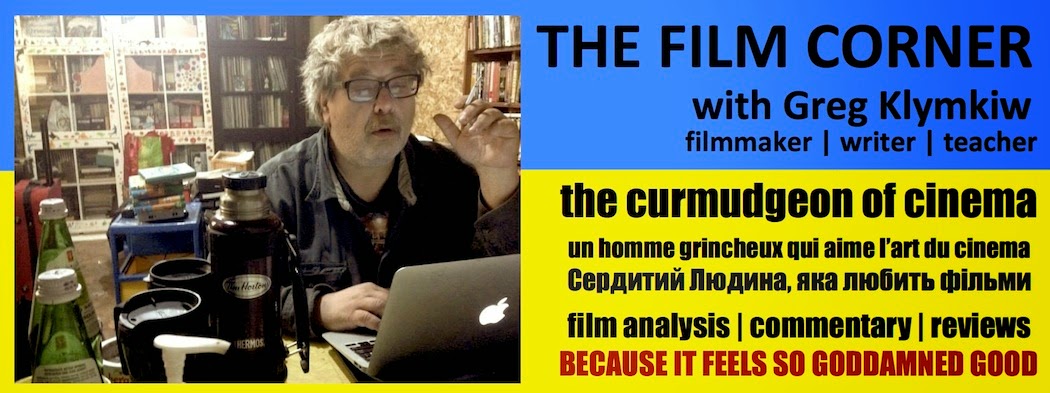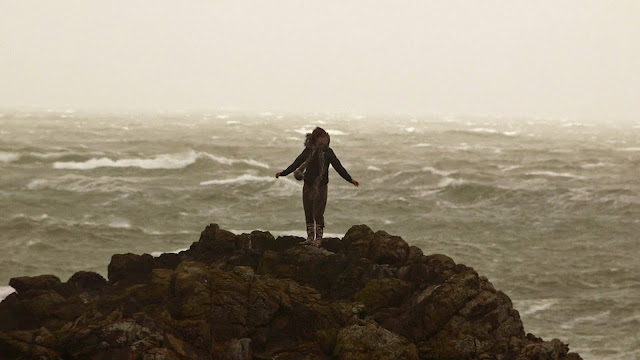Thursday 30 April 2015
HOT DOCS 2015 - HAIDA GWAII: ON THE EDGE OF THE WORLD - Review By Greg Klymkiw ****
Haida Gwaii: On the Edge of the World (2015)
Dir. Charles Wilkinson
Prd. Tina Schliessler
Review By Greg Klymkiw
Some of the most important environmental documentaries being made in the world include the work of Canadian director Charles Wilkinson who knocked us on our collective butts with his powerful energy-consumption doc Peace Out and his potent, strangely uplifting Oil Sands Karaoke, that focused upon the face of humanity amidst the horrific environmental exploitation in the Alberta Tar Sands. His new film, Haida Gwaii: On the Edge of the World, comprises the third of what feels like an unofficial trilogy (which one hopes will continue well beyond its current trinity).
On one hand, the current picture essentially supersedes Wilkinson's previous work with the film's delicate blend of cold, hard facts which, we should all be actively concerned about and, on the other paw, a very gentle (deceptively so) tone poem to one of the greatest natural treasures of the world. Officially known as the Queen Charlotte islands, this gorgeous archipelago in northern British Columbia (BC) comprises about 150 islands and is home to a varied and important population of flora and fauna - vital to the area itself, but also to the world at large.
The Haida Gwaii, which literally translates as "Islands of the Haida people" was traditionally the domain of this great aboriginal nation who prospered here for over 10,000 years until Colonialism decimated the population through both disease and, of course, Canada's uniquely polite form of genocide (both literal and cultural, the latter of which has always been the big stick Whitey calls "assimilation"). Today, however, the dominant population of the Haida Gwaii are the indigenous people of the island and surely they have the right to self-determination. In fact, they do have that right, only it is continually ignored and/or bamboozled by Canadian government bureaucracy.
Treaties in particular continue to be broken and/or ignored under the aegis of Canada's belief that all lands, even if they belong to Aboriginal Nations, are Crown Lands and as such, can be dealt with in any cavalier fashion the government chooses - dispensing, willy-nilly, all manner of dispensation to corporate rapists of the environment. One of Canada's more appalling back-handed acknowledgments of Aboriginal Rights in the Haida Gwaii has been to convert a huge chunk of land not destroyed by clearcut logging and other crimes against the environment into a massive national park. Yes, this protects the land (supposedly in perpetuity) but the park is essentially "owned" and administered by the "Crown" as opposed to those who really own it, the Haida Nation. It's the Government of Canada's God-like assumption that with one hand it giveth and with the other taketh, all in the schizophrenic snow job to make it seem like they respect the First Nations (and by extension, the environment), when in reality, it's to feather the nests of Big Money (and by extension, the on-the-take pockets of politicians).
Ownership of these lands seems almost preposterous to one of the film's subjects. Allan Wilson, the Haida hereditary Chief makes the astute observation: "We care for the land here, but we don't own the Animal Kingdom, it's a part of us, it's family. I kinda think that's the way it is because everything has its part and every part has its value and every value contributes to our life."
The Government of Canada, however, has no values save for those which fill the pockets of politicians' rich friends, and of course, themselves.
Wilkinson's film contains a plethora of alarming facts with respect to this. Two thirds of the Haida Gwaii's forests have been decimated by illegal logging and billions of dollars of profits from this has been dispersed into the pockets of the very few. Yes, Haida people had jobs in logging, but not to the tune of billions of dollars. Besides, in recent years, the jobs issue is a public relations smokescreen since mechanization in the logging industry has swallowed up most of the available jobs. Land and resources are sucked dry, but nothing comes back to the Haida.
Even more sickening is that Canada's Federal Nazi Party (aka The Conservatives), in cahoots with corporate oil interests and the Fascist Party of BC (aka The Liberal Party of BC, aka Really Not Much Different Than The Conservatives Party) are all threatening to upset the natural balance of life in this paradise on Earth with the current desire to plough through the Tar Sands seaway to Asia. The powers-that-be want us to believe it's all about jobs (BC Premier Christy Lemire's spurious excuse for all her dubious decisions), but in reality, the short-term gain of this smokescreen will potentially wreak havoc that can only yield long-term environmental pain.
What the world needs to know, what it needs to wake up to is that First Nations people all over the world have lived with a sustainable relationship to the environment for millennia. This is certainly the case with the Haida. Not that Herr Harper and his cronies at the federal and provincial level care. They and their rich buddies don't need to care. The government has forgotten that it is the People - all people. Still, the rape of the Haida Gwaii is ongoing. At one point, it's revealed that in addition to pipelines, there are plans afoot for huge tanker ships to traverse along the shorelines which are in extremely rough, rocky waters. (Way to go Government and Big Business! Morons!) Even the slightest spill - clearly an inevitability - will contaminate a huge part of the ecosystem and result in both people and animals eating poison food. Then again, why should Harper and his gang of Nazis and Fascists care?
Wilkinson's film cannily places the anger of the Haida Nation over Canada's flagrant violation of Aboriginal Rights within the context of a people who are not only trying to live as traditionally as possible, but in many cases are working towards a reclamation of traditional cultural values which were under Colonial attack for so long. Wilkinson introduces us to Haida elders, activists and even the youth who all provide us with an important perspective - that the people and land are one; they're inextricably linked to the degree that any violation of this connection is not only an infringement upon the Haida, but by extension, all Canadians and frankly, the world. In fairness, Whitey is not only represented as the faceless corporate/governmental evil; Wilkinson also introduces us to those of the pale-skinned persuasion who are equal partners with the Haida in protesting the pillage of this paradise.
The poetic qualities of the film are what ultimately create a love and appreciation for what is both sacred and in need of protection. We are lulled, not into complacency, but the sheer magic these islands provide and the greatest impetus for Canadians and the world at large to reject the illegal, immoral use of these lands to ultimately benefit the very few.
Haida Gwaii: On the Edge of the World might well provide the most persuasive aesthetic argument to save these islands at all costs by placing us into frame of mind which is ultimately the next best thing to actually being there. By the end of the film, we're consumed with deep emotional ties to the land, but most importantly, we're firmly placed in the corner of those who possess the best chance to save our world, those indigenous First Nations who have been able to thrive in spite of the deadly roadblocks placed in front of their right to live freely in their own cultural and environmental milieu.
The Haida are fighters, but their greatest weapon is the land itself. Hats off to Wilkinson for crafting a film which walks tall, yet softly and carries the big stick of our ultimate salvation, the environment itself and, of course, its people, the Haida.
THE FILM CORNER RATING: ***** 5 Stars
Haida Gwaii: On the Edge of the World enjoys its World Premier at Hot Docs 2015. For tickets and info, visit the festival's website by clicking HERE.
Labels:
*****
,
2015
,
Aboriginal
,
Canada
,
Charles Wilkinson
,
Documentary
,
Environment
,
Greg Klymkiw
,
Hot Docs 2015
,
Tina Schliessler

